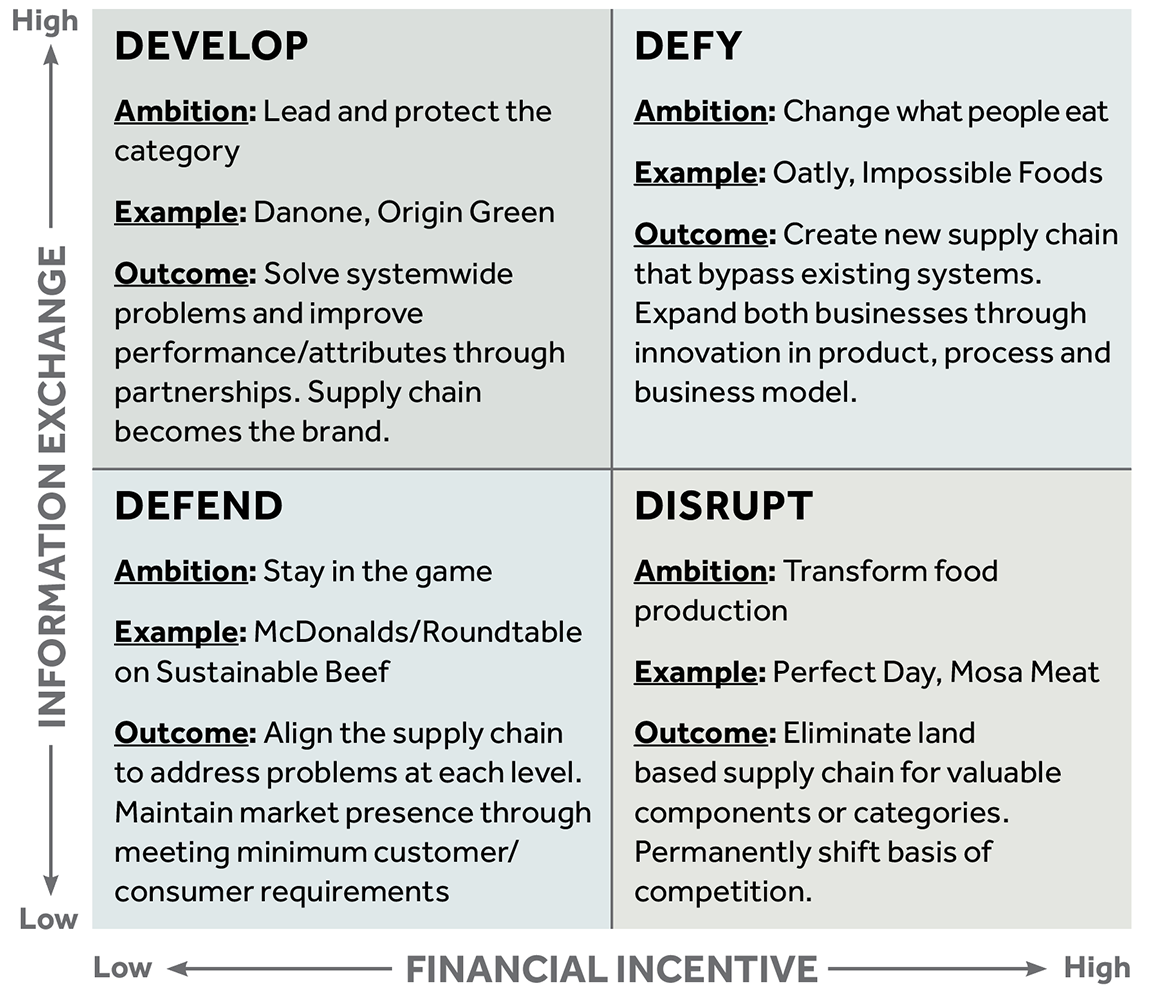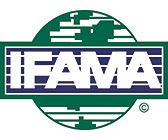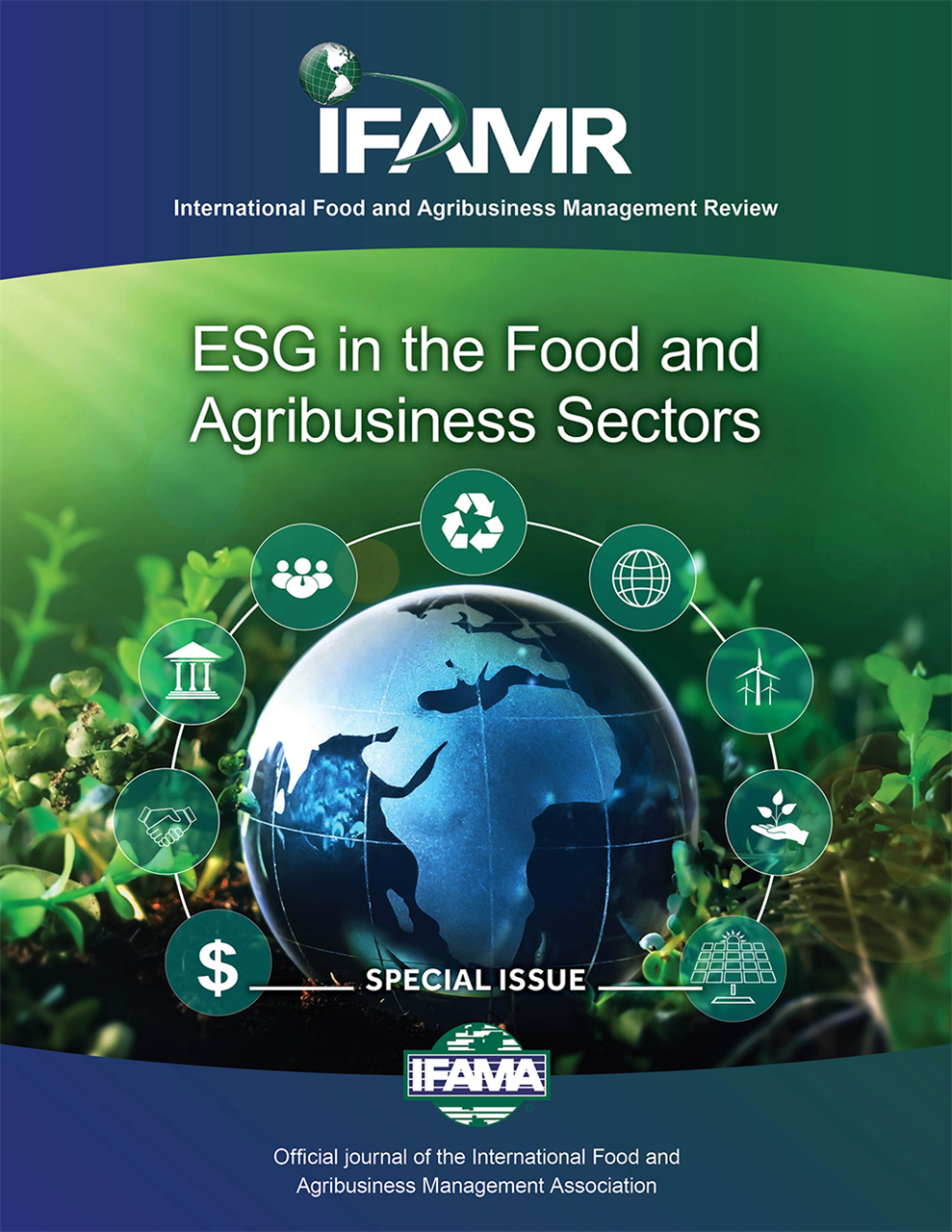| INTERNATIONAL FOOD AND AGRIBUSINESS MANAGEMENT ASSOCIATION |
|
General Statement
Over the past 10 years, calls to transform the global food system have increased. Sustainability, assessed through ESG (Environmental, Social, and Governance) factors, is at the core of many of these conversations. However, sustainability remains a challenge for agri-food companies. The definition of sustainability continues to evolve and expand, leading to shifting goalposts. Consumers expect sustainably produced food, but most are not willing or able to pay extra for it. Approx. 70–90+% of a food product’s footprint occurs inside the farmgate, outside of the company’s direct control. Improving farm-level sustainability requires investment and changes in practices that add upfront costs and management complexity. Further complicating the situation, the global food system plays multiple roles: it’s a source of nutrition, an engine of economic development, a foundation of national and global security, and the largest user of natural resources. This leads to competing objectives and vastly different opinions about what a sustainable food system should look like – with some experts calling for a continued focus on productivity, efficient use of resources on the farm, and reductions in waste along the supply chain, while others call for a fundamental change in human diets including reducing or eliminating meat and dairy consumption.
In this complex, dynamic, and ambiguous world, agri-food companies (and some countries) have adopted different approaches to sustainability. Shelman and McLoughlin (2020) introduced one qualitative framework that classifies strategies based on two dimensions: (i) the level of information exchange along the supply chain (e.g., market information on customer needs and consumer demands regarding sustainability in its broadest sense going upstream to farmers, and information on how a product is produced going downstream to consumers and investors) and (ii) financial incentives (e.g., short-term incentives such as price premiums and preferential loan rates, and longer-term incentives such as multi-year contracts, cost-plus pricing contracts, and investment capital). Four strategies or “pathways” to a sustainable food system were identified (see figure on the next page):
- DEFEND – Doing more with less
- DEVELOP – Differentiate on sustainability criteria
- DEFY – Fundamentally change food and diets
- DISRUPT – New production method
Note that all quadrants are potentially viable strategies, and that the framework is agnostic regarding the desirability of the four strategies.

Areas of Focus
This notice serves as an open call for papers that demonstrate how adopting a strategy based on sustainability/ESG in food and agribusiness leads to enhanced financial performance and/or other desirable outcomes for a company (or country). Three types of contributions are being welcomed:
- Opinion pieces (1000 words)
- Research articles (15 page maximum) contributing novel insights or reviews of the topic
- The editors are specifically looking for Business “Caselets”, short case studies (1000–3000 words) that describe a specific firm’s approach to ESG and answer the following questions:
- Tell us your strategy and how it fits into the “4D” framework (Defend, Develop, Defy, Disrupt).
- How does information exchange work? How do you communicate opportunities and requirements up the supply chain to farmers and sustainability message down the supply chain to customers, consumers, investors, and regulators (if you do so)?
- What financial incentives do you use/receive?
- What role does data play?
- Do you use partnerships and/or other forms of collaboration to execute your strategy?
- What enablers support your approach (e.g., technology such as gene editing, precision farming systems, digitized supply chain, blockchain; dedicated infrastructure; long-horizon capital; regulatory policies or other government support)?
- What benefits are you getting from sustainability (e.g., price premium, market share gain, lower cost, supply security, preferential loan rates, enhanced access to capital)?
- What risks exist with your approach?
Academic articles will be reviewed by the IFAMR Managing Editors and undergo the usual process of double-blind peer review. Opinion pieces and business caselets will be reviewed by the guest editors for succinctness, clarity, and relevance to the business community. The IFAMR will publish a Special Issue containing this collection. A special session is planned during the conference on this topic, that will be used to drive many of the discussions.
Both academic and commercial works are welcome. Commercial submissions will be critically assessed for neutrality and not allowed as a marketing platform. Documented real-world examples of ESG value creation in agriculture are highly valued.
Submission Instructions * Final business caselets are managed by: Mary Shelman: ifamr@ifama.org before 15 April, 2024. |
Special Issue Timeline
29 January, 2024 | Deadline for submitting ESG research papers, extended abstracts for IFAMA 2024 Symposium |
15 March, 2024 |
Notification acceptance to present ESG academic research submissions in Symposium track
|
15 April, 2024 | Deadline to submit final business caselets, opinion pieces |
17-20 June, 2024 |
Presentations of ESG research during Symposium and Business Forum featuring business caselets during IFAMA 2024 World Conference
|
29 July, 2024 | Deadline to submit final papers and caselets to the IFAMR. Blind peer review and publication will be managed by Special Issue Editors, Brent Ross and Damien McLoughlin for FastTrack publication in 2024. |

